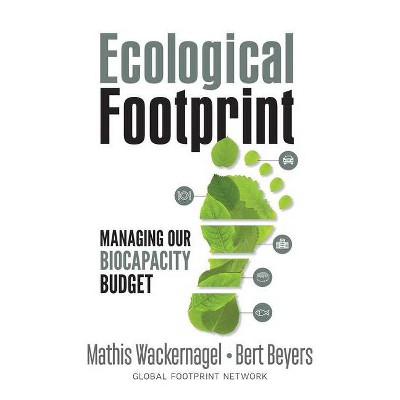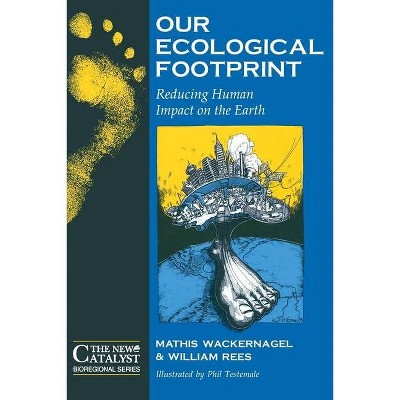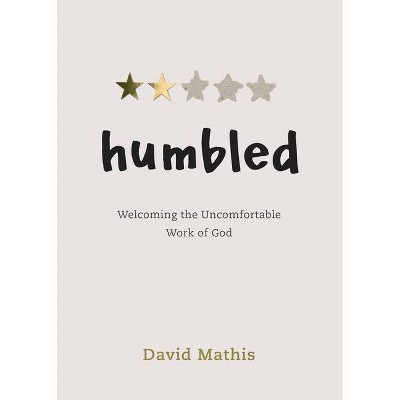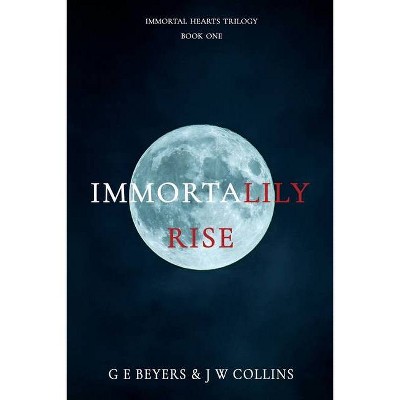Ecological Footprint - by Mathis Wackernagel & Bert Beyers (Paperback)

Similar Products
Products of same category from the store
AllProduct info
<p/><br></br><p><b> About the Book </b></p></br></br>The authors advise readers to run their economies on regeneration, rather than by liquidating the planet. They explain the key tool for the job--footprint and biocapacity accounting--and how it applies to companies, cities, and countries.countries.<p/><br></br><p><b> Book Synopsis </b></p></br></br><p><strong>The only metric that tracks how much nature we have - and how much nature we use</strong></p> <p>Ecological Footprint accounting, first introduced in the 1990s and continuously developed, continues to be the only metric that compares overall human demand on nature with what our planet can renew -- its biocapacity -- and distils this into one number: how many Earths we use. </p> <p>Our economy is running a Bernie Madoff-style Ponzi scheme with the planet. We use future resources to run the present, using more than Earth can replenish. Like any such scheme, this works for a limited time, followed by a crash. </p> <p>Avoiding ecological bankruptcy requires rigorous resource accounting -- a challenging task, but doable with the right tools. </p> <p><em>Ecological Footprint </em>provides a complete introduction, covering: </p> <ul> <li>Footprint and biocapacity accounting </li> <li>Data and key findings for nations </li> <li>Worldwide examples including businesses, cities, and countries </li> <li>Strategies for creating regenerative economies</li> </ul> <p>Whether you're a student, business leader, future-oriented city planner, economist, or have an abiding interest in humanity's future, Footprint and biocapacity are key parameters to be reckoned with and <em>Ecological Footprint </em>is your essential guide. </p><p/><br></br><p><b> From the Back Cover </b></p></br></br>The only metric that tracks how much nature we have - and how much nature we use<p> <i>This book is a loud wake-up call to everyone.</i><br><b>-- CHRISTIANA FIGUERES, former Executive Secretary, UNFCCC</b></p><p><i>Looking for a science-based, practical tool to navigate your future on Earth? Here it is.</i><br><b>-- PROF. JOHAN ROCKSTRÖM, Director, Potsdam Institute for Climate Impact Research</b></p><p>OUR ECONOMY is running a Bernie Madoff-style Ponzi scheme with the planet. We use future resources to run the present, using more than Earth can replenish. Like any such scheme, this works for a limited time, followed by a crash.</p><p> Avoiding ecological bankruptcy requires rigorous resource accounting -- a challenging task, but doable with the right tools.</p><p> Ecological Footprint accounting, first introduced in the 1990s and continuously developed, continues to be the only metric that compares overall human demand on nature with what our planet can renew -- its biocapacity -- and distils this into one number: how many Earths we use.</p><p><i> Ecological Footprint </i>provides a complete introduction, covering: </p><ul><li> Footprint and biocapacity accounting</li><li> Data and key findings for countries</li><li> Worldwide examples including businesses, cities, and countries</li><li> Strategies for creating regenerative economies.</li></ul><p>Whether you're a student, business leader, future-oriented city planner, economist, or have an abiding interest in humanity's future, Footprint and biocapacity are key parameters to be reckoned with, and Ecological Footprint is your essential guide.</p><p> <i>A momentous development, and one that all citizens of the planet should know about.</i><br><b>-- RICHARD HEINBERG, author, <i>The End of Growth</i> and <i>Peak Everything</i></b></p><p><i> Reveals both our alarming self-inflicted situation and the way forward.</i><br><i>-- THOMAS E. LOVEJOY, Professor of Environmental Science and Policy, Institute for a Sustainable Earth, George Mason University</i></p><p> <b>Mathis Wackernagel</b> is co-creator of the Ecological Footprint and president of Global Footprint Network, based in Oakland, California. www.footprintnetwork.org.</p><p><b> Bert Beyers </b>is a senior editor at one of Germany's largest radio stations, located in Hamburg.</p><p/><br></br><p><b> About the Author </b></p></br></br><p><strong>Mathis Wackernagel</strong>, born in Basel, Switzerland, is co-creator of the Ecological Footprint and president of Global Footprint Network, which was named one of the World's 100 Top NGOs by <em>The Global Journal</em>. Wackernagel has worked on sustainability with governments, corporations, and international NGOs on six continents, and has lectured at more than a hundred universities. He previously served as the director of the Sustainability Program at Redefining Progress in California and ran the Centro de Estudios para la Sustentabilidad at Anáhuac University in Mexico. Wackernagel has authored or contributed to over one hundred peer-reviewed papers, numerous articles and reports, and various books on sustainability including the bestselling <em>Our Ecological Footprint</em>. With dozens of international awards and accolades for his pioneering work, he has been identified as a leader who is driving the world's most significant problems to zero. He lives in Oakland, CA. www.footprintnetwork.org </p><p><strong>Bert Beyers</strong>, born in Mönchengladbach, Germany, is a senior editor at the Norddeutscher Rundfunk in Hamburg. For several decades, questions of ecology and future have been his professional passion. He has published widely including a book with Franz Josef Radermacher on survival in the 21st century entitled <em>Welt mit Zukunft: Die ökozoziale Perspektive</em>. He lives in Hamburg, Germany. </p>
Price History
Price Archive shows prices from various stores, lets you see history and find the cheapest. There is no actual sale on the website. For all support, inquiry and suggestion messagescommunication@pricearchive.us




















